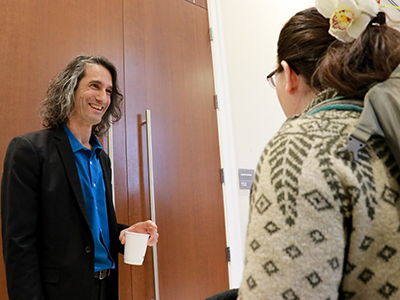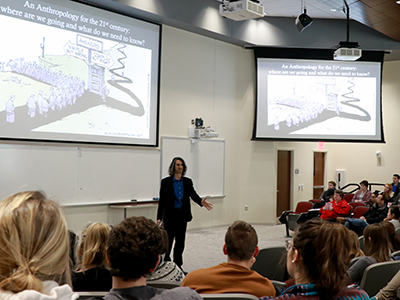Why anthropology matters now: Dr. Augustín Fuentes gives the International Anthropology Day lecture

Written by Adrienne Bechtel and Caroline Igo, CAS communications interns

Dr. Fuentes chats with a student before the lecture.
The Department of Anthropology presented its International Anthropology Day lecture on Thursday, February 27. University of Notre Dame professor Dr. Augustín Fuentes spoke about his experience as a bio-cultural anthropologist and the ways in which anthropology helps us understand human history and culture.
Fuentes is an American primatologist, biological anthropologist, and the Rev. Edmund P. Joyce, C.S.C., Endowed Chair in Anthropology at the University of Notre Dame. His work focuses largely on human and non-human primate interaction, pathogen transfer, communication, cooperation, and human social evolution. He is also an avid writer and explorer for National Geographic.
Origin of Anthropology
"Anthropology is a constant dialectic between the social and the biological,” Fuentes said at the start of his presentation to a packed lecture room in Shideler Hall. "The two processes are one and the same, and understanding the entanglement is the challenge of anthropology."
Anthropology as a discipline dates to the late 19th century and, like all fields of study, it has undergone great changes. But this dynamic field studies a dynamic species; anthropology has changed alongside us.
"Anthropology is not without sin," said Fuentes, adding that anthropology has had to reckon with a past entangled with racism, sexism, and elitism.
"Anthropologists began studying human evolution with the intent to measure skulls and measure people, to say that these people are better," he stated. It was important to understand why certain species survived on a biological level, because early anthropologists set out to explain the success of different races early on in human evolution.
"That's where we come from," said Fuentes. "It is important to understand our history, not deny it, so that we can learn from it and not make the same mistakes."
Beyond human evolution, biological anthropologists like Fuentes study the relationship between culture and genetics, but there is more to the story than just genetic sequences.
"Ancestry can tell us a lot of things, but it can't tell us who we are," Fuentes explained. "We know that DNA sequence variation is critical in understanding the patterns and processes of life," but when the context of culture is stripped away, DNA and RNA can't tell us who we are and why.
"DNA sequence doesn't tell you who you are or what your intelligence is," Fuentes said. "It is not the blueprint of who you're going to become. It is involved, but it is not the answer."
Context of Culture

Dr. Fuentes makes an important point during the lecture.
Fuentes argued that culture must be factored into the equation, and anthropology bridges the gap. Culture enables our capacity for differences and nuances in human behavior.
"While culture exists across the animal world, it is particularly interesting and complicated for humans," he said.
We understand other species by going out and watching them — other primates and animals have social cultures too. But just watching humans tells us very little about why we do the things we do.
"Culture is comprised of rules and organizations interlaced with patterns of social constraints and facilitation," Fuentes said. "It is shared across space and time, and experienced both communally and individually."
However, these rules and social patterns are endlessly complicated and always changing. For anthropologists, studying culture can bring the insight that genetics fails to provide, giving us the whole picture.
Challenge of Race
Race is not marked in DNA and can not explain biological variation, Fuentes explained. Race is a social construct, as is the racism that emerges from that construct. Racial differences "are not supported by genetics."
Fuentes continued, "Race does not provide an accurate representation of human biological variation. It was never accurate in the past, and it remains inaccurate when referencing contemporary human populations."
Anthropology helps to clarify where constructs such as race came from and why they have become so prominent in society today.
"The Western concept of race must be understood as a classification system that emerged from, and in support of, European colonialism, oppression, and discrimination," said Fuentes. "It thus does not have its roots in biological reality, but in policies of discrimination."
Anthropology is a way to better understand these challenges, and to better understand ourselves as humans in the context of our world.
"Humans are messy," said Fuentes. "We need a toolkit that allows us to engage with issues such as race and fight and push back against them. We can't separate biological and genetic processes from cultural ones, but when we disarticulate these components, we can then bring them back together. That’s what anthropology tries to do."
Audience Feedback
"The presentation was a stunningly beautiful synthesis," said M. Cameron Hay-Rollins, professor and chair of the Department of Anthropology. "It contributes to understanding the real problems of the world."
"I thought that the lecture was fascinating and very relevant to what I have been studying," said Faith Walker, a senior anthropology and art & architecture history major.
"Fuentes did an exemplary job of representing what makes anthropology distinctive and what it contributes to pressing, enduring problems," added Dr. James Bielo, assistant professor of anthropology.
"I found the aspects of genetics and culture in anthropology very interesting," said junior zoology major Marie DeLessio. "I learned that you can't fully understand someone based solely on their DNA."

